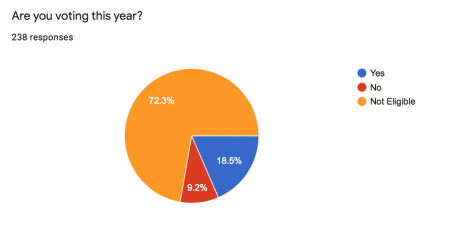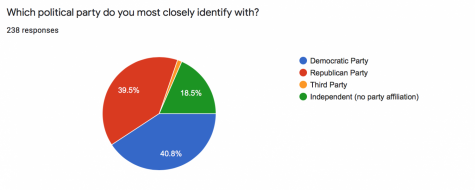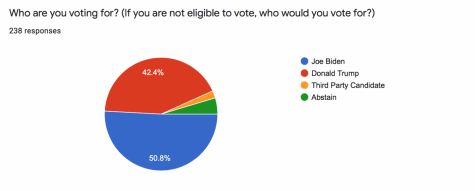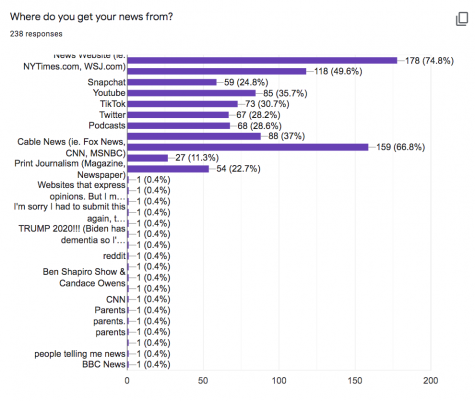Measuring Milken’s Partisan Divide
Chris Wallace struggles to get a word in over the shouts of two frustrated candidates during the first presidential debate. Democrats and Republicans in Congress spend numerous months trying to agree on a desperately-needed COVID-19 relief package. Twitter teems with insults ruthlessly hurled at strangers supporting the opposing party. Friends unfollow each other after heated exchanges about activism posts in their direct messages. Family dinner tables become an ideological battleground between parents and children.
This past year, between a global pandemic and a contentious election, many Americans have not only physically distanced themselves from one another, but they have moved further away from each other on the political spectrum as well. If you are an American or anyone who remotely keeps up with current events, chances are you have seen many examples of this divide in your everyday life.
This trend has also been proven empirically. Preceding and following this year’s presidential race, news sources have been flooded with data regarding differences in political attitudes across the United States. The statistics resoundingly reinforce the notion that polarization and animosity was the undisputed winner of the 2020 election.
Curious to know how our school compares to the rest of the U.S, The Roar sent out an anonymous survey to Milken faculty and students in grades nine through twelve and found a stark partisan split, which is reminiscent of the state of the country as a whole.

The survey was active from Monday, November 2nd until Friday, November 6th. Note that the 238 responses only represent a small fraction of the total 996 Millken faculty and students. Respondents also opted in voluntarily, which along with other factors, such as the wording of the questions, may skew the results. Further, while 72.3% of respondents said that they are not eligible to vote in this election, only 66% of the eligible voters indicated that they planned on voting this year: a figure which is almost identical to this year’s national data.

Remarkably, the number of people who identify as Democrats versus Republicans was nearly identical with Democrats leading by three votes, demonstrating a stark, partisan divide. The Milken data also contrasts with the voter registration data of the greater city of Los Angeles, where 57% of registered voters are Democrats and only 13% are Republicans, suggesting that Republicans may be overrepresented at Milken compared to the surrounding community.

In terms of the presidential race, Milken respondents favored Joe Biden over Donald Trump by a margin of 20 votes. Examination of individual responses shows that Joe Biden also won over the majority of independent voters. Again, a partisan divide is evident here as well.

Since media consumption may impact public opinion, The Roar felt compelled to ask, “Where do you get your news from?” and offered a variety of choices. The top 5 most popular options in descending order were news websites (74.8%), cable news (66.8%), Instagram (49.6%), radio (37%), and Youtube (35.7%). Interestingly, social media sites made up a significant portion of the top five, reflecting the national emergence of social media sites as go-to news sources. Regrettably, Facebook was left off this list perhaps due to its growing irrelevance to teens and young adults. The “Other” section received a mix of interesting answers. Three respondents indicated their parents and one even cited Saturday Night Live as a news source.
Too often, it is easy to adopt the so-called “us versus them” mentality and assume the absolute worst about those who differ from us, without actually engaging in productive dialogues with them. This mindset is especially difficult to abandon during this digital age as artificial intelligence algorithms present us with information, true and false alike, which affirm rather than challenge our opinions.
But while the numbers indicate that Milken is not currently immune to the immense political polarization in our country, certainly each of us can choose to have empathy for and conversations with one another to promote an environment of humanity over hostility.
In the words of Rabbi Amy Eilberg, the first woman ordained as a Conservative rabbi by the Jewish Theological Seminary, “If you want to contribute to the healing of society, reach out to the other with humility and curiosity, and prepare to be surprised.”

Kayla is a senior at Milken and the Co-Editor-in-Chief for The Roar. Kayla joined The Roar in her sophomore year and since then has enjoyed writing about...
Teddy Gillman is a junior at Milken, and is in his second year doing writing for the Milken Roar. He joined Journalism because he likes reading the news,...



